How Nigel Farage became part of the Harry and Meghan television saga
The Brexiteer and the Sussexes reflect a nation still bickering on social media, says Sean O’Grady


Never one to let things slide, Nigel Farage has hit back at the Harry and Meghan Netflix documentary in his usual rather clever and robust fashion.
In covering the strained atmosphere in Britain during the height of the Brexit debates, which came just as Harry and Meghan’s relationship was becoming public, the documentary-makers (styling themselves H and M) suggested that Brexit had fuelled racism, and thus the public reaction to their relationship. The film even included a clip of Farage declaring that “immigration is the number one issue”, with the historian David Olusoga pointing out, perfectly reasonably, that immigration is often a trigger for racism.
Naturally, Farage doesn’t take this lying down. On Twitter, he noted the Sussexes “choose to use Brexit as one of the causes of the terrible racism that was put against them”. (Interesting that he accepts racism was indeed “put against them”.) However, he twists their contention to make it look absurd, interpreting their stance to be that “52 per cent of Prince Harry’s country of birth are bad, racist people”. Which is, of course, not what they said at all. They were talking about a certain motivating political mood among some – acknowledged by Farage – and the general media reaction to his fiancée’s background.
By way of correction, we should perhaps recall the infamous “Breaking Point” poster unveiled by Farage during the 2016 referendum. It featured a long line of what looked like mainly Asian refugees and migrants, predominantly male. The picture was taken on the Croatia-Slovenia border a year earlier, around the time Angela Merkel allowed refugees into Germany.
It was bold even by the standards of Farage’s Leave.eu campaign, and elicited swift condemnation, being compared to Nazi propaganda and disowned by Boris Johnson as “not our campaign”. Around 90 minutes after the poster was unveiled, Labour MP Jo Cox was assassinated by a white extremist. Farage laid flowers at her memorial, but did not apologise for the poster or call it a mistake. Farage rejected any link in a speech a few days later: “I want to say: that man, who has his own mental health issues, that man acted in isolation. What that man did was an act of barbarism and every one of us who will go out to vote leave condemns utterly what he did.”
In fairness, it’s also true that the wedding of Harry and Meghan on 19 May 2018 was a day of enormous public enthusiasm for the couple, and much optimism about what they could bring to the institution of the monarchy. Meghan’s arrival would make the royal family look a little more like the multiracial, multicultural kingdom they purport to reign over, and the Commonwealth where the monarch serves as ceremonial figurehead. But it wasn’t long before the high hopes faded.
And so, more than six years after Brexit began and Harry began dating Meghan, Britain is still a divided nation bickering on social media. It feels like it will never end, and Harry, Meghan, Farage or any of the many other active combatants in the culture war will ever make peace. It keeps them so busy, why would they?



Join our commenting forum
Join thought-provoking conversations, follow other Independent readers and see their replies
Comments